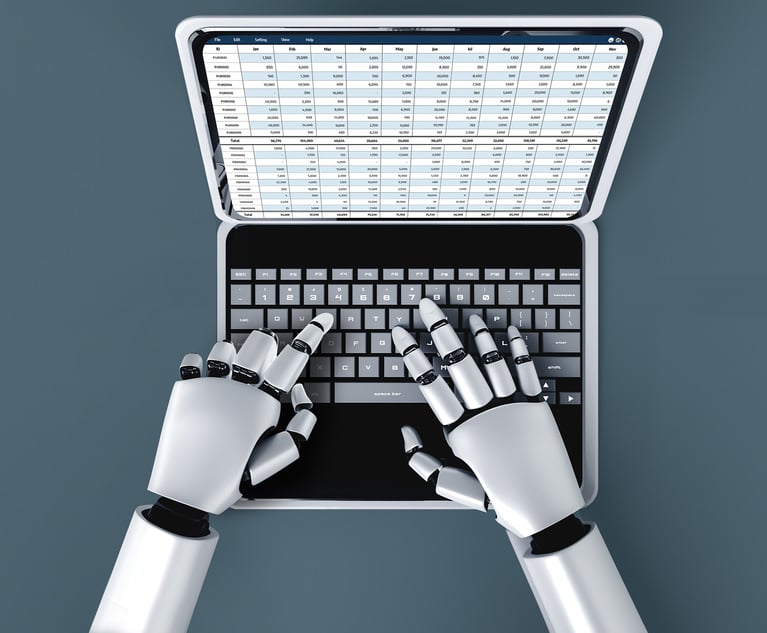 credit: Summit Art Creations/Adobe Stock
credit: Summit Art Creations/Adobe Stock Is International Regulation of AI Moving in the Right Direction or Moving at All?
A year ago on Nov. 1, national leaders, heads of international institutions, policymakers, and technology executives from around the world gathered together at Bletchley Park, north of London, England, to address the threat that artificial intelligence (AI) poses to us all. Are we any safer from AI in the interim 12 months?
October 31, 2024 at 01:02 PM
4 minute read
A year ago on Nov. 1, national leaders, heads of international institutions, policymakers, and technology executives from around the world gathered together at Bletchley Park, north of London, England, to address the threat that artificial intelligence (AI) poses to us all. Are we any safer from AI in the interim 12 months?
The transformational potential and the promise of AI are well laid out, so we won't rehash them here. But let's discuss why should we worry about AI risks. There is no shortage of havoc that AI tools could wreak on our societies. There is the misinformation, thanks to deepfakes and other false "news" that could affect public security and confidence in the political process. There is the use of facial technology to affect our liberties by entrenching bias in the criminal justice system and perpetuating inequitable outcomes like false arrests and unfair sentences. There is also the threat that other AI tools pose to our privacy, including the right to own our images, voices and likeness. There is the disparate impact that automation in sectors like health care and financial services poses—particularly to people of color and other traditionally marginalized communities. And then there is the fear of potential job losses to automation as some of the knowledge-based work gets replaced by Artificial Intelligence, that as the quip goes needs neither coffee breaks nor healthcare. And then there is the dark specter of automation of warfare to keep us up at night, worried. Indeed, every country is grappling with the same kinds of questions and searching for ways to mitigate the risks that this rapidly evolving technology brings in its wake.
NOT FOR REPRINT
© 2025 ALM Global, LLC, All Rights Reserved. Request academic re-use from www.copyright.com. All other uses, submit a request to [email protected]. For more information visit Asset & Logo Licensing.
You Might Like
View AllTrending Stories
- 1Some Thoughts on What It Takes to Connect With Millennial Jurors
- 2Artificial Wisdom or Automated Folly? Practical Considerations for Arbitration Practitioners to Address the AI Conundrum
- 3The New Global M&A Kings All Have Something in Common
- 4Big Law Aims to Make DEI Less Divisive in Trump's Second Term
- 5Public Notices/Calendars
Who Got The Work
J. Brugh Lower of Gibbons has entered an appearance for industrial equipment supplier Devco Corporation in a pending trademark infringement lawsuit. The suit, accusing the defendant of selling knock-off Graco products, was filed Dec. 18 in New Jersey District Court by Rivkin Radler on behalf of Graco Inc. and Graco Minnesota. The case, assigned to U.S. District Judge Zahid N. Quraishi, is 3:24-cv-11294, Graco Inc. et al v. Devco Corporation.
Who Got The Work
Rebecca Maller-Stein and Kent A. Yalowitz of Arnold & Porter Kaye Scholer have entered their appearances for Hanaco Venture Capital and its executives, Lior Prosor and David Frankel, in a pending securities lawsuit. The action, filed on Dec. 24 in New York Southern District Court by Zell, Aron & Co. on behalf of Goldeneye Advisors, accuses the defendants of negligently and fraudulently managing the plaintiff's $1 million investment. The case, assigned to U.S. District Judge Vernon S. Broderick, is 1:24-cv-09918, Goldeneye Advisors, LLC v. Hanaco Venture Capital, Ltd. et al.
Who Got The Work
Attorneys from A&O Shearman has stepped in as defense counsel for Toronto-Dominion Bank and other defendants in a pending securities class action. The suit, filed Dec. 11 in New York Southern District Court by Bleichmar Fonti & Auld, accuses the defendants of concealing the bank's 'pervasive' deficiencies in regards to its compliance with the Bank Secrecy Act and the quality of its anti-money laundering controls. The case, assigned to U.S. District Judge Arun Subramanian, is 1:24-cv-09445, Gonzalez v. The Toronto-Dominion Bank et al.
Who Got The Work
Crown Castle International, a Pennsylvania company providing shared communications infrastructure, has turned to Luke D. Wolf of Gordon Rees Scully Mansukhani to fend off a pending breach-of-contract lawsuit. The court action, filed Nov. 25 in Michigan Eastern District Court by Hooper Hathaway PC on behalf of The Town Residences LLC, accuses Crown Castle of failing to transfer approximately $30,000 in utility payments from T-Mobile in breach of a roof-top lease and assignment agreement. The case, assigned to U.S. District Judge Susan K. Declercq, is 2:24-cv-13131, The Town Residences LLC v. T-Mobile US, Inc. et al.
Who Got The Work
Wilfred P. Coronato and Daniel M. Schwartz of McCarter & English have stepped in as defense counsel to Electrolux Home Products Inc. in a pending product liability lawsuit. The court action, filed Nov. 26 in New York Eastern District Court by Poulos Lopiccolo PC and Nagel Rice LLP on behalf of David Stern, alleges that the defendant's refrigerators’ drawers and shelving repeatedly break and fall apart within months after purchase. The case, assigned to U.S. District Judge Joan M. Azrack, is 2:24-cv-08204, Stern v. Electrolux Home Products, Inc.
Featured Firms
Law Offices of Gary Martin Hays & Associates, P.C.
(470) 294-1674
Law Offices of Mark E. Salomone
(857) 444-6468
Smith & Hassler
(713) 739-1250






